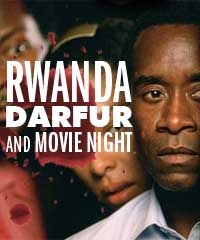You may wonder if you will ever change the world, but if you’re involved in a Christian group on campus, you have more influence that you think.
Rwanda, Darfur and movie night

Once a month the small but growing InterVarsity chapter at East Carolina University (NC) trades their regular chapter meeting for an outreach event called “Preview” that includes a presentation of the gospel and a call to response. Their decision to show a movie on genocide seemed like an odd choice — or was it?
Last spring, the students decided to show the movie Hotel Rwanda and have a discussion afterward. They thought this movie would attract those on campus who are justice-minded but don’t yet know the source of justice in the Lord. They hoped, too, that those coming to this sort of movie would likely have strong opinions to contribute to a lively discussion afterward.
The InterVarsity students worked hard to spread the word. The student leaders, mostly freshmen, handed out fliers. They started conversations about the movie while eating lunch or waiting for class to start. They emailed. They spread the word on Facebook and made posters and banners, hanging them in prominent parts of the campus. There was excitement as the big night approached.
But the big night didn’t start out very exciting. The showing was planned for 7:00 pm. At 7:03 pm there were only five InterVarsity students in the room. The InterVarsity staff worker was frustrated, discouraged and disappointed, so she left the room to pray in the rain outside. She knew the students were invested and involved in reaching out the campus, and she didn’t know what to say to these freshmen and young leaders who had worked so hard and apparently saw no fruit. The Lord provided no answer for her.
When she went back into the room, there were a few new faces. After chatting for a bit, one woman said, “Oh yeah, our whole class is coming over.”
Soon after, a professor walked in. He had seen a flyer and thought it was the perfect thing for his Reporting class to come to. He was particularly interested in having his students see the role of reporting in the movie. As the Western media avoided showing the genocide in Rwanda, it affected our country’s response — or lack thereof. Soon more of the class filed in.
After the movie, all the new students were encouraged to stay for the discussion, but only the professor stayed. So the journalism professor and a group of about eight InterVarsity students sat around a table and talked about justice. Conversation drifted towards action steps, particularly what they could do about Darfur — an eerily similar situation in Africa happening currently, with similarly horrible results.
The professor thought the main problem was that people simply didn’t know about the situation in Darfur. Then he said, “What if I got my class, as part of next week’s assignment, to research what is happening in Darfur and we reported our findings to you guys next week? This is a good opportunity for us to use our reporting skills and maybe we can figure out some next steps to take a stand on Darfur.”
This opened up doors for a handful of students to connect and plan an event later in the semester that would raise awareness on campus about the genocide in Darfur. Their unified commitment to social justice compelled them to act — and it all started with movie night.






